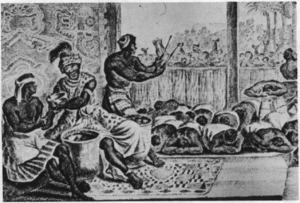Despotism facts for kids
Despotism is a type of government where one person or a small group holds all the power. This ruler, called a despot, has complete control over everything. They make all the decisions without anyone else's input.
Today, the word "despot" often describes a ruler who uses their power unfairly. They might be harsh or cruel to their people. This is similar to words like "tyrant" or "dictator". However, in the past, "despot" was sometimes a respected royal title given to important leaders.
Contents
What Does "Despotism" Mean?
Despotism means a system where one person has total power. They can do whatever they want without rules or limits. Imagine a school where only one teacher makes all the rules. They decide everything, from what you learn to when you have lunch. That's a bit like a despot.
In a despotic government, citizens usually have very few rights. They cannot speak out against the ruler. They also cannot choose their leaders. This kind of rule is often seen as unfair and oppressive.
Where Did the Word "Despot" Come From?
The word "despot" comes from the Greek word despotes. This old Greek word meant "master" or "one with power." In ancient Greece, a despotes was the head of a household. They had control over their servants or slaves.
Over time, the meaning of the word changed. It started to describe rulers who had absolute power over a country.
Despots in History
Even though "despot" sounds negative today, it was once an important official title. This was especially true in the Byzantine Empire. The Byzantine Empire was a powerful state that lasted for over a thousand years.
- A Royal Title: The title "Despot" was first used in the Byzantine Empire around the 1100s. Emperor Manuel I Komnenos created it for his chosen heir.
- Special Privileges: Despots were usually close family members of the Emperor. They were often sons-in-law or sons. They wore fancy clothes, similar to the Emperor's. They also had many special rights and honors.
- Ruling Regions: Despots sometimes ruled over parts of the empire. These areas were called "Despotates."
So, for a long time, being called a "Despot" was a sign of high rank and power. It was not seen as a bad thing.
Modern Meaning of Despotism
Today, the word "despotism" almost always has a negative meaning. It describes a government that is unfair and controlling. When people talk about a "despot" now, they usually mean a ruler who:
- Has too much power.
- Does not care about the rights of their people.
- Uses force or fear to stay in charge.
This modern meaning is very different from its historical use as a royal title. It highlights the dangers of having too much power in one person's hands.


